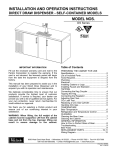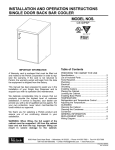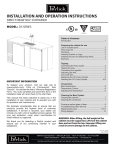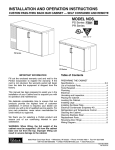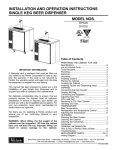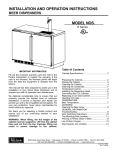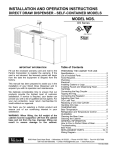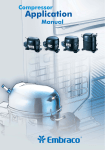Download Perlick DC Series Beverage Dispenser User Manual
Transcript
INSTALLATION AND OPERATION INSTRUCTIONS CONCESSIONAIRE PORTABLE DISPENSERS MODEL NOS. DC Series IMPORTANT INFORMATION Complete the enclosed warranty card and mail to the Perlick Corporation to register the warranty. If the card is not returned, the warranty period will begin from the date the equipment is shipped from the factory. This manual has been prepared to assist you in the installation of your Concessionaire Dispenser and to acquaint you with its operation and maintenance. We dedicate considerable time to ensure that our products provide the highest level of customer satisfaction. If service is required, your dealer can provide you with a list of qualified service agents. For your own protection, never return merchandise for credit without our approval. We thank you for selecting a Perlick product and assure you of our continuing interest in your satisfaction. WARNING: When lifting, the full weight of the cabinet must be supported. Lift from the cabinet base and not from the top. Improper lifting can result in severe damage to the cabinet. Table of Contents PREPARING THE CABINET FOR USE Specifications.........................................................2 List of Included Parts.............................................3 Tools Required.......................................................3 Plumbing................................................................3 Electrical ................................................................3 Installing Casters ...................................................3 TAPPING Connecting the Keg Coupler .................................4 Tapping the Keg.....................................................4 Connecting the Regulator......................................5 Adjusting Gas Flow................................................5 CO2 Leak Test .......................................................5 Replacing a CO2 Gas Cylinder..............................5 Handling CO2 Gas .................................................5 TEMPERATURE Beer Temperature ..................................................6 CLEANING Cleaning the Beer Lines ........................................7 Cleaning the Cabinet .............................................7 GENERAL INFORMATION How to Pour a Perfect Glass of Beer ....................8 Troubleshooting .....................................................9 Beer Facts .............................................................9 REPLACEMENT PARTS ................................10-11 Wiring Diagram....................................................12 8300 West Good Hope Road • Milwaukee, WI 53223 • Phone 414-353-7060 • Fax 414-353-7069 Toll Free 800-558-5592 • E-Mail: [email protected] • www.Perlick.com Form No. Z2060A Rev. 12.05.03 Installation and Operating Instructions Sizes and Specifications, Concessionaire Dispensers MODEL NOS. DC2KP DC3KP DC4KP KEG CAPACITY 2 Keg 3 Keg 4 Keg DIMENSIONS Length Ins. (mm) 72” (1829) 84” (2134) 96” (2438) CABINET Depth Ins. (mm) 241/8” (613) 241/8” (613) 241/8” (613) Height Ins. (mm) 341/2” (876) 341/2” (876) 341/2” (876) NO. OF DISPENSING HEADS 1 1 2 NO. FAUCETS 2 2 2 1/4 1/3 1/3 CONDENSER UNIT H.P. RUNNING LOAD - AMPS 5.9 7.5 7.5 SHIP WT lbs. (kg) 445 (202) 505 (229) 545 (247) INTERIOR Fourteen gauge stainless steel sills are reinforced with a 12 gauge angle bracket that extends from one end of the insulated base to the other. The floor pan is 20 gauge, type 304 stainless steel. The walls and ceiling are 20 gauge galvanized steel. EXTERIOR The top is 20 gauge stainless steel. Bottom is 20 gauge stainless steel. Doors, front, back and sides are 20 gauge black powder coated steel. STORAGE COMPARTMENTS Side compartment houses a four gallon stainless steel drainer overflow tank, two drain valves with garden hose fittings for cabinet floor drain and overflow tank, and 20 lb. CO2 drum holder. Front compartment provides storage for cups or other non-refrigerated items. REFRIGERATION R-134a capillary tube-type. Aluminum fin and copper tube evaporator coil. Forced air into dispensing head. Adjustable temperature control. Self-defrosting. Pull-out condensing unit for service and cleaning. VENTILATION Front ventilated. ELECTRICAL 115 Volt, 60 Hz., 1 Phase AC. Furnished with three prong, six foot rubber cord. Contact Perlick for other voltage/frequency requirements. PLUMBING None required. Condensate evaporates automatically. INSULATION Foamed-in-place polyurethane; 2” walls, 11/2” top and floor. OPTIONAL ACCESSORIES • Optional Dispensing Heads • Shelf Kit • Faucet Locks • Keg Couplers • Regulators Perlick is committed to continuous improvement. Therefore, we reserve the right to change specifications without prior notice. Form No. Z2060A Rev. 12.05.03 2 Preparing the Cabinet for Use – Concessionaire Dispensers Parts List ■ ■ ■ ■ ■ ■ ■ Plumbing Faucet Standard. Faucet Head Assembly Caster Set. Black Connector Hose 3⁄16” x 3’. 5 ⁄16” Air Hose. Spanner Wrench. Bag of Miscellaneous Parts. None required. Garden hose connections for dumping liquid wastes. Electrical The cabinet must be connected to a separately fused power source (see electrical specification plate) and grounded in accordance with National and Local Electrical Codes. Caution: Do not attempt to operate the equipment on any other power source than that listed on the Electrical Specification plate. Tools Required ■ ■ ■ ■ ■ #2 Phillips Screwdriver. Spanner Wrench (included). #10 Crescent Wrench. 9/ 16” Allen Wrench. 3/ 8” Nut driver. Installing the Faucet and Dispensing Head Before you begin: Wash dispensing head and faucet. Flush beer, dispensing head and faucet lines with fresh water. ■ Apply RTV around the base of the dispensing head to seal it to the top. Align the dispensing head over the five holes on the cabinet top and use the five stainless steel #10-32 x 13⁄4” Phillips pan head stainless steel machine screws to secure standard to cabinet top. Wipe off excess RTV to complete the seal. ■ Attach faucet to standard using spanner wrench to tighten coupling. Attach faucet handle to faucet. ■ Insert flexible plastic air hose six to seven inches into bottom of faucet standard. Secure hose with tie wrap (supplied). Uncrating and Inspection Remove all crating material before operating. Carefully inspect cabinet for hidden damage. If damage is discovered, file your claim immediately with the transportation company. Perlick is not responsible for damage in transit. Installing Casters IMPORTANT: Attach casters to the cabinet bottom so that caster is centered over cabinet seam. Use supplied 1/ 4”- 20 x 3/ 4” hex head self-tapping machine screws. CASTER MOUNTING PLATE MUST STRADDLE SEAM COMPRESSOR HOUSING SCREWS CENTER CASTERS REQUIRED ON DC4KP (4 KEG CONCESSIONAIRE) DRY STORAGE COMPARTMENT CASTER MOUNTING PLATE MUST STRADDLE SEAM Perlick is committed to continuous improvement. Therefore, we reserve the right to change specifications without prior notice. 3 Form No. Z2060A Rev. 12.05.03 Installation and Tapping – Concessionaire Dispensers Connecting the Keg Coupler (when Supplied by Perlick) ■ ■ ■ ■ Tapping a Single Valve Keg (Sankey): Place one brown leather washer into black beer line connector hose on hex nut side. Screw connector to stainless steel beverage line on faucet standard. Tighten with a wrench, but do not over tighten. Make sure lever handle on the keg coupler is in the UP (untapped) position. Place one brown leather washer into wing nut end of black beer line connector hose and thread onto top of keg coupler. Hand tighten. Place clamp on one end of red air line. Push end over air valve located inside cabinet. Tighten clamp with screwdriver. Turn shut-off valve to OFF (horizontal) position. Place clamp on the other end of red air line and push over tailpiece on coupler. Tighten clamp with screwdriver. CAUTION: Do not use keg coupler as a handle to lift keg. Step 1 Single Valve Keg Coupler OUT Step 3 DOWN Step 2 1/4 TURN ■ ■ ■ ■ Be sure beer faucet is in closed position. Align keg lugs with lug openings on bottom of coupler. Turn clockwise 1⁄4 turn. Pull handle out and down. Keg is now tapped. Open shut-off valve on air divider located inside of the cabinet. Important: Be sure to close this valve when untapping keg. Perlick is committed to continuous improvement. Therefore, we reserve the right to change specifications without prior notice. Form No. Z2060A Rev. 12.05.03 4 Installation and Tapping – Concessionaire Dispensers ■ Connecting the Regulator to the CO2 Cylinder ■ ■ ■ ■ Remove blue plug from regulator fitting. (Note: Do not remove the carbonic washer). Screw regulator onto gas cylinder valve. Tighten with wrench until vertically straight. Be sure that shut-off valve (black lever) on regulator is in the OFF (horizontal) position. Place a screw clamp over end of red air line and push onto regulator tailpiece. Tighten clamp with a screwdriver. ■ ■ Unscrew regulator from cylinder fitting. Replace carbonic washer (Part No. 157F2P), if needed and reattach regulator to filled cylinder. Turn CO2 hand valve counterclockwise until fully open. Turn regulator shut-off valve to open position. Adjust CO2 gas flow as required, turning clock wise for higher pressure. Proper CO2 Handling ALWAYS... CO2 PRESSURE GAUGE REGULATOR FITTING ■ HAND VALVE ■ 20 30 40 PERLICK 50 10 PSI 0 60 ■ ■ ■ CO2 GAS DRUM ■ FITTING FOR RED AIR HOSE ■ SHUT-OFF VALVE (BLACK LEVER IN CLOSED POSITION) REGULATOR ADJUSTING SCREW ■ Connect a regulator (reducing valve) to CO2 cylinder. Secure cylinder in upright position whether in storage or in use. Keep cylinder away from heat. Rupture disc vents at 122° F. maximum. Ventilate room after high pressure gas leakage. Check the last DOT test date on cylinder neck before filling. If more than five years old, the cylinder must be retested to DOT specifications. Be sure CO2 cylinder outlet fitting is free of dust or dirt before attaching regulator. Store CO2 cylinder and regulator assembly upright. Allow only properly trained and experienced personnel to handle high pressure gas. NEVER... Adjusting the CO2 Gas Flow ■ ■ ■ ■ ■ Connect cylinder directly to a keg without a regulator (reducing valve). ■ Drop or throw regulator or CO2 cylinder. ■ Transport CO2 cylinder in a closed vehicle. ■ Apply oil to a regulator. ■ Shut off CO2 cylinder when not in use. You will not save gas by doing so! ■ Allow untrained, inexperienced personnel to handle high pressure gas. Failure to heed this warning could result in personal injury or death. Turn regulator adjusting screw counterclockwise until it turns freely. Turn hand valve counterclockwise on CO2 cylinder to the fully open position. Turn regulator adjusting screw clockwise until desired pressure is reached (approximately 12-15 lbs.). Tighten stop nut on adjusting screw. Open shut-off valve on bottom of regulator. CO2 Leak Test Dilute a small amount of liquid dishwashing soap and rub the soapy mixture around each connection. If bubbles appear, tighten connection. WARNING/SAFETY INSTRUCTIONS Beverage systems pressurized with carbon dioxide or nitrogen must be equipped with two safety relief valves; one at the cylinder regulator and the other in the gas line upstream on the product tanks. Replacing CO2 Gas Cylinder ■ Turn CO2 hand valve clockwise until seated and close shut-off valve on regulator. Perlick is committed to continuous improvement. Therefore, we reserve the right to change specifications without prior notice. 5 Form No. Z2060A Rev. 12.05.03 Draft Beer Information – Concessionaire Dispensers Temperature One of the most common causes of dispensing problems is improper temperature. Draft beer should be stored at a temperature between 32° and 38°. At warmer temperatures, beer will foam. At temperatures lower than 30° F., beer will freeze. When beer freezes, the alcohol in the beer may separate and cause the beer to be cloudy with an “off” taste. Refrigeration and Temperature Control Adjusting the temperature The Direct Draw Dispenser is equipped with a heavy-duty refrigeration system designed to automatically maintain a storage temperature of 36-41 degrees F. The control is factory set at 38 degrees F. The temperature control is inside the cabinet on the right-hand side of the evaporator fan panel assembly. You will need a screwdriver to turn the adjusting screw. Make small adjustments until the desired temperature is achieved. ■ Colder Temperatures: Turn the adjusting screw clockwise (to the right). ■ Warmer Temperatures: Turn the adjusting screw counterclockwise (to the left). The condenser fan motor turns off and on with the condensing unit. The evaporator fan motor runs continuously. The fan motors are lifetime lubricated and will require no oiling. NOTE: Cabinet Temperatures lower than 34° will not allow for proper defrosting of the evaporator coil. If defrosting is necessary, turn the control knob to the OFF position until coil is defrosted. Perlick is committed to continuous improvement. Therefore, we reserve the right to change specifications without prior notice. Form No. Z2060A Rev. 12.05.03 6 Cleaning the Beer System – Concessionaire Dispensers ■ The entire beer system, to include the faucet, flexible beer line and tapping devices must be cleaned at regular intervals. We recommend flushing the entire system with fresh water immediately after a keg has been emptied. Once each month the system should be cleaned chemically. It is recommended that you purchase Perlick’s Pump Type Sterilizer, as shown below. It is equipped with an adapter that attaches directly to the faucet shank in lieu of the faucet. It is also available with a slip coupling for those who choose to clean their faucets in place. Part Nos. 887P 887PSC 848A33 Description 1 ⁄2 Gallon sterilizer w/faucet coupling. 1 ⁄2 Gallon sterilizer w/slip coupling. 33 oz. Liquid Alkaline cleaner. Beer Stone: All beer contains calcium which is present from the grains used in the brewing process. it is an important natural material in draft systems in that as it oxidizes it coats the internal parts of the beer lines and equipment. This thin coat of beer stone helps prevent the beer from picking up strong metallic or plastic flavors as it flows through the system. The beer stone will continue to build if the system is not cleaned properly or regularly and can cause drawing problems if it begins to flake off. Beer stone is present if one can see a brownish color on the faucet or inner wall of the beer line, or tobaccolike flakes in the beer. Cleaning the Cabinet Cleaning the draft beer system will help to eliminate the build-up of the following materials: ■ Bacteria: Beer is an excellent food for bacteria (none of which is harmful). Proper conditions may begin the growth of bacteria in draft beer and on the beer faucet. By regular cleaning, we prevent this bacterial buildup and maintain the quality of the No. 887P draft beer. Greenish or yellowish colored material on the faucet may indicate bacterial growth. ■ Yeast: All domestic draft beers contain a small amount of yeast which remains in the beer from the fermentation process. When the temperature of draft beer exceeds 50° a process of secondary fermentation may take place. The beer faucet may exhibit a white colored substance (yeast build up) if not cleaned on a regular basis. Use a mild detergent and water to clean the inside and outside of the cabinet. Dry thoroughly. Never use a scouring pad or abrasive cleanser. NOTE: An industrial strength, commercial cleaner can be used to clean the outside of painted cabinets. Cleaning the Condenser Use a long handled, stiff brush to clean the dirt from the front surface of the condenser. Keeping the condenser free from dust and dirt will ensure efficient operation. CAUTION: Do not bend the fins while brushing the front of the condenser. Perlick is committed to continuous improvement. Therefore, we reserve the right to change specifications without prior notice. 7 Form No. Z2060A Rev. 12.05.03 Pouring a Perfect Glass of Beer – Concessionaire Dispensers STEP 1 ➠ Start with a clean glass. Place the glass at a 45° angle, one inch below faucet. Do not let the glass touch the faucet. Open the faucet all the way. STEP 2 ➠ After the glass has reached half full, gradually bring the glass to the upright position STEP 3 ➠ Let the remaining beer run straight down the middle of the glass. This ensures proper release of CO2 by producing a 3⁄4” to 1” foam head. STEP 4 ➠ Close the faucet quickly and completely. Perlick is committed to continuous improvement. Therefore, we reserve the right to change specifications without prior notice. Form No. Z2060A Rev. 12.05.03 8 Trouble Shooting – Concessionaire Dispensers Beer Service Problems ■ ■ Cloudy Beer: Beer in glass appears hazy, not clear. CAUSES: ■ Dirty glass. ■ Dirty faucet or beer line. ■ Frozen or nearly frozen beer. ■ Old beer. ■ Beer that has not been refrigerated for a long period of time. Wild Beer: Dispensed beer has either too much foam or is all foam. CAUSES: ■ Beer has been dispensed improperly. Solution: See pouring instructions on page 8. ■ Regulator pressure is set too high. ■ Warm keg temperature. Solution: Keg must be colder than 40°. Target temperature is between 36° and 38° F. ■ Cabinet door is opened and closed frequently and temperature is warmer than 38° F. Solution: Adjust temperature to between 36° and 38° F. ■ Kinks, dents or obstructions in the line. ■ Using oddly shaped glasses. Frosted, waxed or styrofoam containers may cause foaming. ■ Dispenser has been turned off for a long period of time. ■ Faucet is bad, dirty or in a worn condition. ■ Regulator malfunction. Beer and CO2 Facts Keg Size Quarter Half ■ ■ ■ ■ ■ No. of Gallons No. of Oz. No. of Cases 73⁄4 151⁄2 992 1,984 3.445 6.889 No. of Full Keg 12Oz. Weight Servings 105 87 lbs. 210 161 lbs. Beer foam is 25% liquid beer and 75% CO2 gas. Don’t waste it! Most people prefer beer stored at 38° F. Beer lines and faucets require regular cleaning (see cleaning instructions on page 7). A fully-charged 4.2 lb. CO2 cylinder will dispense approximately 51⁄2 to 61⁄2 half barrels. CO2 gas gives beer its sparkling effervescence. It also gives beer its creamy head of foam. ■ Flat Beer: Foamy head disappears quickly; beer lacks brewery fresh flavor. CAUSES: ■ Dirty glassware. ■ CO2 pressure is too low, due to leak or pressure setting. ■ CO2 is turned off at night. ■ Cooler is too cold. ■ CO2 leak or defective (sticking) check valve. ■ Sluggish CO2 regulator. Perlick is committed to continuous improvement. Therefore, we reserve the right to change specifications without prior notice. 9 Form No. Z2060A Rev. 12.05.03 Replacement Parts – Concessionaire Dispensers MODEL NOS. All Models Left hinged door assembly Right hinged door assembly Magnetic door gasket Hinge set, left Hinge set, right Elbow-nylon 3⁄4” F.P.T. x 1⁄2” barb 1 ⁄2” trans vinyl beverage tubing 8.7 ft. Glass rack Bulb clamp Wiring harness Fan motor 51/2” diameter fan blade Fan guard assembly Fan motor 1⁄3, 1⁄4 and 1⁄5 h.p. Door locks Door lock Trim ring Lock bracket Waste tank assembly 3 ⁄4” ball valve 3/4” adapter male hose x F.P.T. Pocket pull flush handle Dry storage door assembly Door assembly Magnetic catch Shelf kit Condensing units (2 door models) 1/ 4 h.p. condensing unit 115 volt, 60 hz. Condensing unit (model UFI10HBX) Compressor (model FFI10HBX) Fan Motor Assembly Condenser coil Terminal board Overload protector Relay Capacitor (282-339 MFD. 155V) Coil assembly 2 door SC BB Fin coil, evaporator Two-way air distributor assembly Condensing units (3 & 4 door models) 1/3 h.p. condensing unit 115 volt Condensing unit (model UFI12HBX) Compressor (model FFI12HBX) Fan Motor Assembly Condenser coil Terminal board Overload protector Relay Capacitor (378-454 MFD. 115V) Coil assembly 3⁄4 door SC BB Fin coil, evaporator Shelf kit, center Three-way air distributor assembly Four-way air distributor assembly DC2KP DC3KP DC4KP 64357SLBL 64357SRBL 62085-1 63407L 63407R 57736-1 1390TR C24639-1 C6634 61186-1 C15239A 57699 C25395 57513 61259 61260 57811 57781-1 62287 57793 57800 57775 62278 62279 C15381 57928 64357SLBL 64357SRBL 62085-1 63407L 63407R 57736-1 1390TR C24639-1 C6634 61186-1 C15239A 57699 C25395 57513 61259 61260 57811 57781-1 62287 57793 57800 57775 62278 62279 C15381 57928 64357SLBL 64357SRBL 62085-1 63407L 63407R 57736-1 1390TR C24639-1 C6634 61186-1 C15239A 57699 C25395 57513 61259 61260 57811 57781-1 62287 57793 57800 57775 62278 62279 C15381 57928 C22647 N/A N/A 515301063 513200314 215315009 15352019 219101538 MRT20AGK5590 21351619 13556529 62210A1* C17511-1 C18942 N/A N/A N/A N/A N/A N/A N/A N/A N/A N/A N/A N/A N/A N/A N/A N/A N/A N/A N/A N/A N/A N/A N/A N/A N/A N/A N/A N/A N/A N/A N/A N/A N/A N/A N/A N/A C22646 515301062 513200003 215315009 15352019 219101538 MRT22AFZ5590 21351619 13556532 62210A2* C17511-2 57929 C18943 C18944 C22646 515301062 513200003 215315009 15352019 219101538 MRT22AFZ5590 21351619 13556532 62210A2* C17511-2 57929 C18943 C18944 Perlick is committed to continuous improvement. Therefore, we reserve the right to change specifications without prior notice. Form No. Z2060A Rev. 12.05.03 10 Replacement Parts – Concessionaire Dispensers For Single Valve Keg Coupler (Series D) Item Part No. No. Description 1 ............26000D ..............Single valve keg coupler 2 ............C14316 ..............“O” ring 3...........31080-2P.............Ball check 4...........31089-2P.............“O” ring (3 per assembly) 5...........31088-2P.............Bottom seal washer 6...........31087-2P.............Probe washer domestic 7............157R2P ..............Coupling Gasket 8...........23682-2P.............Check valve 1 2 3 4 7 8 5 6 Miscellaneous Part No. Description 157L2P................Beer line connector gasket 57F2P .................CO2 tank washer 1392R .................Red air hose 529 ......................Beer hose 2928D .................Twin gauge CO2 regulator Perlick is committed to continuous improvement. Therefore, we reserve the right to change specifications without prior notice. 11 Form No. Z2060A Rev. 12.05.03 Wiring Diagram – Concessionaire Dispensers 8300 West Good Hope Road • Milwaukee, WI 53223 • Phone 414-353-7060 • Fax 414-353-7069 Toll Free 800-558-5592 • E-Mail: [email protected] • www.Perlick.com Perlick is committed to continuous improvement. Therefore, we reserve the right to change specifications without prior notice. 12 Form No. Z2060A Rev. 12.05.03












